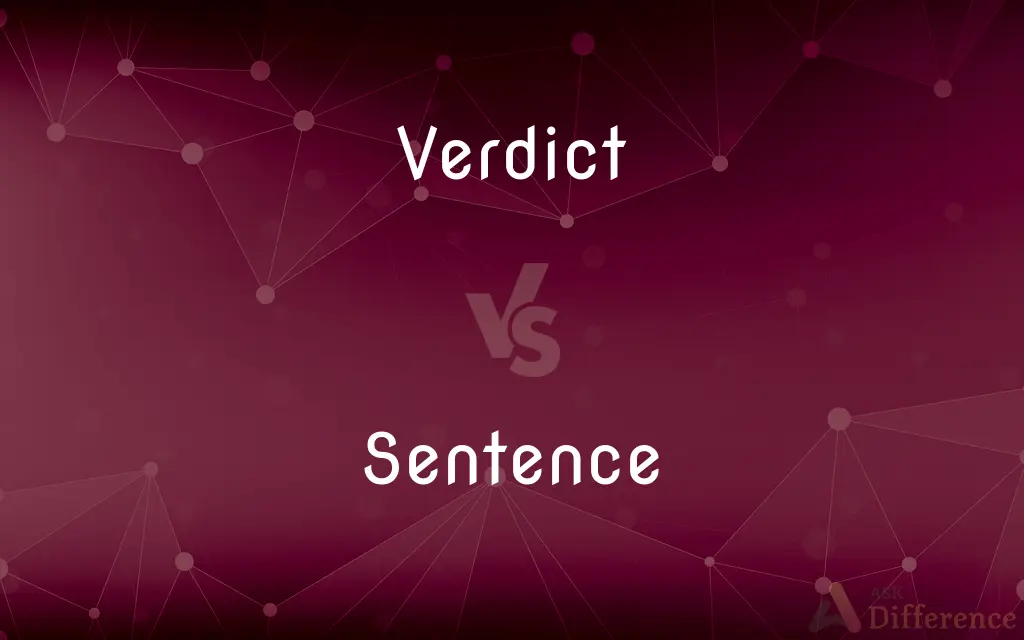Verdict vs. Sentence — What's the Difference?
By Tayyaba Rehman — Updated on December 29, 2023
A "verdict" is the decision made by a jury or judge on the matters of fact in a legal case, while a "sentence" is the punishment assigned by a judge following a guilty verdict.

Difference Between Verdict and Sentence
Table of Contents
ADVERTISEMENT
Key Differences
A verdict is a formal decision or finding made by a jury or judge on the matters of fact in a case. A sentence is the punishment or legal consequence that follows a guilty verdict, determined by a judge.
The verdict is typically delivered by a jury (or a judge in a bench trial) and determines the guilt or innocence of the defendant. The sentence is decided and imposed by a judge, outlining the type and duration of punishment.
A verdict is a critical point in the legal process, concluding the trial phase with a judgment of guilt or innocence. A sentence is a subsequent phase, where the court determines the appropriate penalty based on the verdict.
The verdict is a determination of fact, based on the evidence presented during the trial. The sentence is a judicial determination of the appropriate punishment, often guided by legal standards and frameworks.
The verdict directly affects the outcome of a trial, determining whether the defendant is legally responsible. The sentence impacts the defendant's immediate future, dictating the repercussions of the guilty verdict.
ADVERTISEMENT
Comparison Chart
Definition
Decision on the facts of a case
Punishment assigned for a crime
Delivered By
Jury or judge
Judge
Stage in Legal Process
Conclusion of trial
Post-trial phase
Nature
Judgment of guilt or innocence
Determination of penalty
Example
"The jury returned a guilty verdict."
"The judge sentenced him to 5 years."
Compare with Definitions
Verdict
A judge's ruling in a non-jury trial.
The judge's verdict was unexpectedly lenient.
Sentence
The punishment assigned by a court to a convicted person.
The sentence for the crime was ten years in prison.
Verdict
The outcome of judicial deliberations.
The courtroom awaited the verdict anxiously.
Sentence
The legal outcome in terms of punishment for an offense.
His sentence was reduced due to good behavior.
Verdict
A jury's decision in a trial about the guilt or innocence of the defendant.
The verdict of 'not guilty' was met with relief.
Sentence
A judicial decree determining a criminal's punishment.
The judge's sentence was deemed fair by many.
Verdict
A conclusion or judgment in a legal case.
After deliberation, the verdict was announced.
Sentence
The consequence following a guilty verdict.
After the verdict, the sentence was swiftly delivered.
Verdict
An official decision made after a legal trial.
The verdict confirmed the defendant's innocence.
Sentence
A formal declaration by a judge of the penalty for a crime.
The sentence included community service.
Verdict
In law, a verdict is the formal finding of fact made by a jury on matters or questions submitted to the jury by a judge. In a bench trial, the judge's decision near the end of the trial is simply referred to as a finding.
Sentence
A grammatical unit that is syntactically independent and has a subject that is expressed or, as in imperative sentences, understood and a predicate that contains at least one finite verb.
Verdict
(Law) The decision of the jury after the trial of a case.
Sentence
The penalty imposed by a law court or other authority upon someone found guilty of a crime or other offense.
Verdict
An expressed conclusion; a judgment or opinion
The verdict of history.
Sentence
(Archaic) A maxim.
Verdict
(legal) A decision on an issue of fact in a civil or criminal case or an inquest.
The jury returned a “not guilty” verdict.
Sentence
(Obsolete) An opinion, especially one given formally after deliberation.
Verdict
An opinion or judgement.
A “not out” verdict from the umpire
Sentence
To impose a sentence on (a criminal defendant found guilty, for example).
Verdict
The answer of a jury given to the court concerning any matter of fact in any cause, civil or criminal, committed to their examination and determination; the finding or decision of a jury on the matter legally submitted to them in the course of the trial of a cause.
Sentence
(dated) The decision or judgement of a jury or court; a verdict.
The court returned a sentence of guilt in the first charge, but innocence in the second.
Verdict
Decision; judgment; opinion pronounced; as, to be condemned by the verdict of the public.
These were enormities condemned by the most natural verdict of common humanity.
Two generations have since confirmed the verdict which was pronounced on that night.
Sentence
The judicial order for a punishment to be imposed on a person convicted of a crime.
The judge declared a sentence of death by hanging for the infamous child rapist.
Verdict
(law) the findings of a jury on issues of fact submitted to it for decision; can be used in formulating a judgment
Sentence
A punishment imposed on a person convicted of a crime.
Sentence
(obsolete) A saying, especially from a great person; a maxim, an apophthegm.
Sentence
(grammar) A grammatically complete series of words consisting of a subject and predicate, even if one or the other is implied, and typically beginning with a capital letter and ending with a full stop or other punctuation.
The children were made to construct sentences consisting of nouns and verbs from the list on the chalkboard.
Sentence
(logic) A formula with no free variables.
Sentence
(computing theory) Any of the set of strings that can be generated by a given formal grammar.
Sentence
(obsolete) Sense; meaning; significance.
Sentence
(obsolete) One's opinion; manner of thinking.
Sentence
A pronounced opinion or judgment on a given question.
Sentence
To declare a sentence on a convicted person; to condemn to punishment.
The judge sentenced the embezzler to ten years in prison, along with a hefty fine.
Sentence
To decree, announce, or pass as a sentence.
Sentence
(obsolete) To utter sententiously.
Sentence
Sense; meaning; significance.
Tales of best sentence and most solace.
The discourse itself, voluble enough, and full of sentence.
Sentence
An opinion; a decision; a determination; a judgment, especially one of an unfavorable nature.
My sentence is for open war.
That by them [Luther's works] we may pass sentence upon his doctrines.
Sentence
A philosophical or theological opinion; a dogma; as, Summary of the Sentences; Book of the Sentences.
Sentence
In civil and admiralty law, the judgment of a court pronounced in a cause; in criminal and ecclesiastical courts, a judgment passed on a criminal by a court or judge; condemnation pronounced by a judicial tribunal; doom. In common law, the term is exclusively used to denote the judgment in criminal cases.
Received the sentence of the law.
Sentence
A short saying, usually containing moral instruction; a maxim; an axiom; a saw.
Sentence
A combination of words which is complete as expressing a thought, and in writing is marked at the close by a period, or full point. See Proposition, 4.
He fills, he bounds, connects, and equals all.
A king . . . understanding dark sentences.
Sentence
To pass or pronounce judgment upon; to doom; to condemn to punishment; to prescribe the punishment of.
Nature herself is sentenced in your doom.
Sentence
To decree or announce as a sentence.
Sentence
To utter sententiously.
Sentence
A string of words satisfying the grammatical rules of a language;
He always spoke in grammatical sentences
Sentence
(criminal law) a final judgment of guilty in a criminal case and the punishment that is imposed;
The conviction came as no surprise
Sentence
The period of time a prisoner is imprisoned;
He served a prison term of 15 months
His sentence was 5 to 10 years
He is doing time in the county jail
Sentence
Pronounce a sentence on (somebody) in a court of law;
He was condemned to ten years in prison
Common Curiosities
Who decides the verdict in a trial?
In a jury trial, the jury decides the verdict; in a bench trial, the judge does.
Is a unanimous decision required for a verdict?
In most criminal trials, a unanimous verdict is required, but rules can vary.
Can a verdict be "not proven"?
In some legal systems, like Scotland, there's a "not proven" verdict, which is not the same as "not guilty."
Is a sentence always prison time?
No, sentences can include fines, community service, probation, or other forms of punishment.
Can a sentence be changed?
Yes, sentences can be modified upon appeal or review.
Can a verdict be guilty and sentence be none?
Unusual, but possible, especially in cases of extenuating circumstances or legal technicalities.
Can a sentence include rehabilitation?
Yes, rehabilitation programs can be part of a sentence.
How long after a verdict is a sentence given?
Sentencing can occur immediately or be scheduled for a later date.
Are all crimes punishable by a sentence?
If a crime is proven and results in a guilty verdict, it typically leads to a sentence.
Is a hung jury a type of verdict?
A hung jury, where the jury can't reach a unanimous decision, results in no verdict.
Can a verdict be appealed?
Yes, verdicts can be appealed in higher courts.
Who can deliver a verdict?
A verdict is delivered by a jury or, in a bench trial, by a judge.
Can minors receive the same sentences as adults?
It depends on the legal system, but often minors are sentenced differently.
Can a sentence be life imprisonment?
Yes, for serious crimes, a life sentence can be imposed.
Do all countries use the jury system for verdicts?
No, the use of juries varies by country and legal system.
Share Your Discovery

Previous Comparison
Rip vs. Tear
Next Comparison
Hollow vs. ShallowAuthor Spotlight
Written by
Tayyaba RehmanTayyaba Rehman is a distinguished writer, currently serving as a primary contributor to askdifference.com. As a researcher in semantics and etymology, Tayyaba's passion for the complexity of languages and their distinctions has found a perfect home on the platform. Tayyaba delves into the intricacies of language, distinguishing between commonly confused words and phrases, thereby providing clarity for readers worldwide.














































